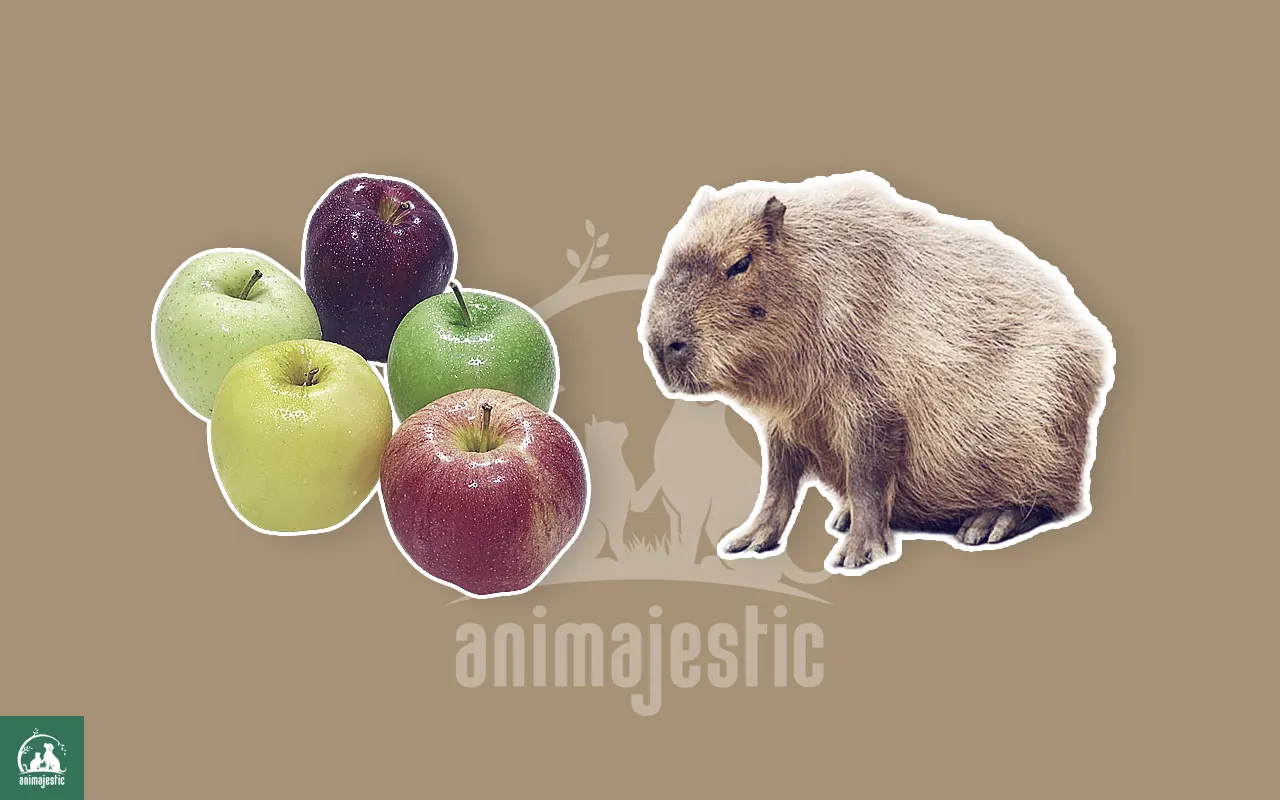“Can capybaras eat apples?” is one of the questions that has bubbled to the forefront for new pet owners as capybara ownership has become more widespread around the world.
Native to South America, these gentle semi-aquatic creatures have found their way into homes all across the globe. Naturally, capybara owners seek to ensure the health and happiness of their beloved pets by providing a diet that caters to their unique needs.
An important facet of this diet is deciding which fruits, such as apples, can be safely incorporated.
In this article, we dive into capybaras’ dietary preferences and guidelines for feeding them apples.
Understanding the Capybara’s Natural Diet
To determine if apples can be part of a capybara’s diet, it is essential first to explore their natural eating habits in the wild.
Herbivores at Heart
Capybaras are primarily herbivores, which means their diet is plant-based. Some of their preferred food sources include:
- Grasses (such as water hyacinth and papyrus) and other aquatic plants
- Leaves
- Tree bark
- Bushes and shrubs
Their natural environment comprises river banks, forests, and wetlands, providing them with ample vegetation to munch through.
Capybaras possess specialized teeth and an efficient digestive system that helps them break down and derive nutrition from fibrous plants that may elude their smaller rodent relatives.
Role of Fruits
While fruits are not a prominent part of a capybara’s diet in its natural habitat, these creatures may occasionally indulge in fruits, including apples, when found in the wild.
Can Capybaras Eat Apples?: The Benefits and Drawbacks
The short answer is, YES. But with a better understanding of capybaras’ natural diet, it is possible to examine whether apples make a safe and nutritious addition to their diet in domestic settings.
Nutrient Bonanza
Fruits like apples provide a welcome source of vitamins and minerals. Apples are packed with vitamins A and C, both of which contribute to a strong immune system and overall health.
Additionally, the fiber in apples can help improve their digestion and promote gut health.
Sugar Overdose
Despite these nutritional benefits, it’s important to be cautious about overfeeding capybaras with apples. Apples, like most fruits, contain higher levels of sugar than capybaras are normally accustomed to consuming.
If given in excess, these high sugar levels can put your pets at risk for obesity, diabetes, and other health-related issues. Therefore, moderation is crucial when feeding apples to your capybara.
Smart Apple Feeding Guidelines for Capybaras
To ensure you’re harnessing the benefits of apples in your capybara’s diet without harming them, adhere to the following guidelines:
- Remove seeds: Apple seeds contain a compound called amygdalin, which releases cyanide in small amounts when ingested. Although the quantity is minimal, it’s best to stay on the safe side and remove the seeds before feeding.
- Watch the portion size: Don’t let apples dominate your capybara’s diet. Instead, offer apple slices as an occasional treat or reward. Ensure the majority of their food intake consists of grasses and other fibrous plants, which are central to their natural eating habits.
- Clean thoroughly: Before feeding apples to your capybara, ensure they are washed properly. This step eliminates any pesticide residues or dirt that may be present on the fruit.
- Consult a veterinarian: When in doubt, consult a veterinarian with experience treating capybaras. They can offer personalized guidance on how best to incorporate this fruit and other dietary considerations tailored to your pet’s specific needs.
In summary, apples can be a nutritious and enjoyable snack for your capybara, as long as they are fed in moderation and prepared carefully.
Maintaining an appropriate balance of the different food sources will keep your capybara healthy and happy. Remember to consult with a veterinarian if you have concerns or questions about your pet’s diet.
